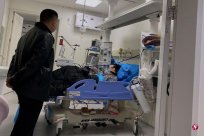(Bloomberg, New York) was worried about the upset of the crown disease, and the United States repeatedly stated to China that it intends to provide advanced crown vaccines, but China has repeatedly refused, which has deeply frustrated American officials.
According to Bloomberg, some U.S. officials who are unwilling to disclose their identity revealed that due to the emergence of new crown -mutant strains and the concerns of the Chinese economy, the United States has repeatedly stated that it intentionally provides China to provide messenger ribonucleic acid (mRNA).Vaccine and other assistance; due to the political sensitivity of foreign aid for foreign assistance, the United States also proposed to provide Chinese vaccines through indirect channels.
In December last year, when East Asian Affairs Assistant Secretary of State Kangda and the Senior Director of the National Security Council Rosenberg, Rosenberg made assistance suggestions to Chinese leaders; in addition, the United States passed public health officials and intermediaries.Simultaneous suggestions were made to China.
China Foreign Ministry spokesman Mao Ning said at a routine press conference on Friday that China's vaccine and medical supplies were "sufficient overall".She said: "We will continue to cooperate with the international community, including the United States to better cope with the challenge of crown diseases." At present, Omikon virus has been raging in China, and no one knows how much the MRNA vaccine can play.What China is even more needed now is that infected antiviral drugs such as Paxlovid of Pfizer.
A problem faced by the Chinese government is to persuade the elderly to vaccine.As of the release of the last time in November, about two -thirds of the elderly over 80 years of age in China had vaccinated the vaccine.
For Chinese officials, accepting American vaccines in political uplift will highlight Beijing's failure to develop its own MRNA vaccine.
Both sides are frustrated on the current situation, which highlights how difficult it is to have a stable relationship in the United States. There are still distrust and suspicion of the two economies.
The Chinese Research Project Director of the China Think Tank Strategy and International Research Center, Brandchet, said: "For a long time, the Chinese government's propaganda on the prevention and control of crown disease has been emphasized that the" success "of resistance to disease is the result of the achievement of China's unique political systemTherefore, artificially limited the opportunity to obtain external vaccines. "
Branchete said that during the severe period of crown disease, Beijing continued to emphasize vaccine nationalism, which will undoubtedly lead to unnecessary death.
A American insider said that the United States has more actively showing that it will be helpful in recent weeks.Another person said that the two sides continued to communicate through the channels of health officials, but every time Chinese officials said that Beijing had controlled the situation and did not need assistance.
In fact, China is not lacking in the pipeline of the MRNA vaccine.The Chinese company Shanghai Fosun Pharmaceutical Group has obtained a sales license for vaccines jointly developed by German Biotechnology Corporation and Pfizer, and plans to sell 100 million vaccines in China, but Beijing officials have not yet approved.
Liu Pengyu, a spokesman for the Chinese Embassy in Washington, issued a statement on Thursday that Chinese vaccine inventory "can meet demand" and is deploying to strengthen immunization.He added that health officials between China and the United States will keep in touch.


